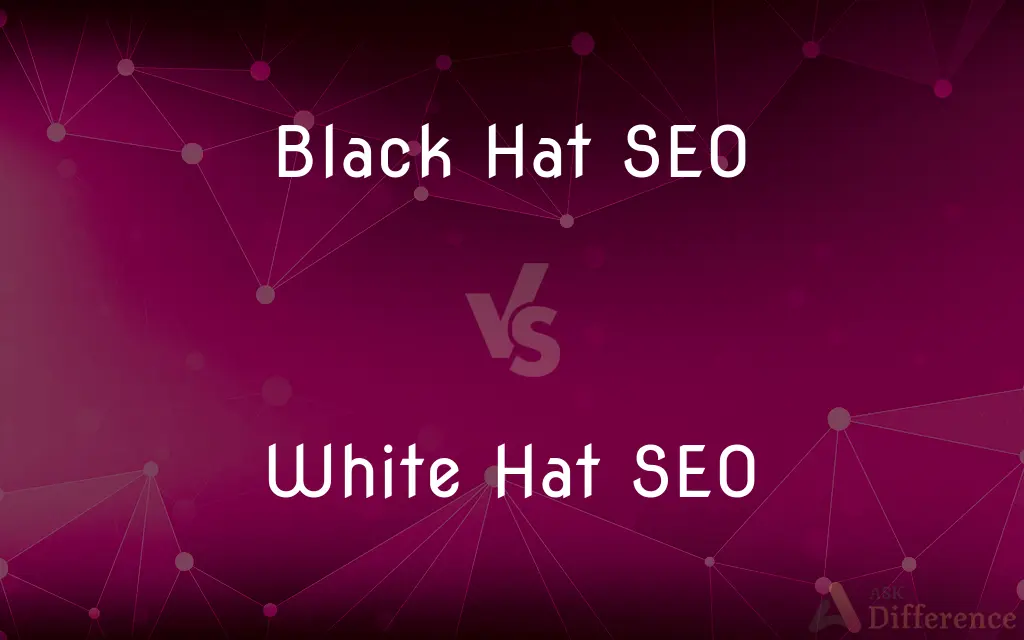Black Hat SEO vs. White Hat SEO — What's the Difference?
By Tayyaba Rehman — Published on December 3, 2023
Black Hat SEO employs unethical tactics to boost rankings, risking penalties, while White Hat SEO uses approved strategies to improve site visibility organically.

Difference Between Black Hat SEO and White Hat SEO
Table of Contents
ADVERTISEMENT
Key Differences
Black Hat SEO and White Hat SEO are two fundamentally different approaches to search engine optimization, a digital marketing practice focused on enhancing a website's visibility on search engines. They represent opposite ends of the ethical spectrum in SEO techniques.
Black Hat SEO involves manipulative and often deceptive practices that attempt to trick search engines into ranking a website higher than it should be. Such practices may offer quick results but often lead to penalties or even removal from search engine results if detected. On the contrary, White Hat SEO emphasizes using ethical, approved, and sustainable methods to improve a site's ranking, even if results may take longer to materialize.
Adopting Black Hat SEO techniques can be tempting for businesses seeking rapid gains. These can include keyword stuffing, cloaking, and using hidden text. White Hat SEO, in contrast, focuses on quality content creation, relevant keyword integration, and building genuine backlinks.
White Hat SEO strategies, grounded in adhering to search engine guidelines, are more likely to stand the test of time, even as search algorithms evolve. Black Hat SEO tactics, however, are always at risk, with practitioners continually trying to stay one step ahead of search engines' ever-improving detection methods.
For businesses aiming for long-term success and online reputation, White Hat SEO is the preferred route. Meanwhile, those using Black Hat SEO not only risk penalties but also erode trust among their audience and potential customers.
ADVERTISEMENT
Comparison Chart
Ethical Stance
Unethical, violates search engine guidelines
Ethical, adheres to search engine guidelines
Techniques Used
Keyword stuffing, cloaking, hidden text
Quality content, genuine backlinks, relevant keyword integration
Risk
High risk of penalties or de-indexing
Low risk, compliant with search engine standards
Duration of Results
Quick, but not sustainable
Takes time but offers lasting results
Audience Focus
Targets search engines primarily
Targets users with quality content and good user experience
Compare with Definitions
Black Hat SEO
Focuses on quick, short-term results.
They saw a rapid spike in traffic due to Black Hat SEO, but it didn't last.
White Hat SEO
Prioritizes quality content and user experience.
Through White Hat SEO, they offer valuable information to visitors.
Black Hat SEO
Unethical search engine optimization practices.
The website faced penalties for using Black Hat SEO tactics.
White Hat SEO
Ethical SEO practices adhering to guidelines.
Their consistent growth can be attributed to White Hat SEO efforts.
Black Hat SEO
Often manipulative and deceptive.
Using hidden text on the page is a sneaky Black Hat SEO tactic.
White Hat SEO
Builds trust and reputation over time.
Users trust sites that employ White Hat SEO more than manipulative ones.
Black Hat SEO
Tactics violating search engine guidelines.
Keyword stuffing is a frowned-upon Black Hat SEO strategy.
White Hat SEO
Long-term and sustainable approach.
White Hat SEO strategies have kept them on the first page for years.
Black Hat SEO
Risks penalties or de-indexing from search engines.
After the algorithm update, many Black Hat SEO sites disappeared from the results.
White Hat SEO
Focuses on genuine audience engagement.
Thanks to White Hat SEO, their audience engagement metrics have soared.
Common Curiosities
Why is White Hat SEO preferred?
It's sustainable, ethical, and focuses on genuine user engagement.
Does White Hat SEO deliver quicker results than Black Hat SEO?
No, White Hat SEO typically takes longer but yields sustainable results.
How does White Hat SEO differ from Black Hat SEO?
White Hat SEO uses ethical techniques aligned with guidelines, while Black Hat SEO employs manipulative tactics.
Is it possible to recover from Black Hat SEO penalties?
Yes, by rectifying the issues and submitting a reconsideration request to search engines.
What is Black Hat SEO?
It's an unethical approach to SEO that violates search engine guidelines for quick gains.
What's an example of a Black Hat SEO tactic?
Keyword stuffing or using hidden text on web pages.
How can I ensure my strategies are White Hat SEO?
Stay updated with search engine guidelines and prioritize user experience.
Is Black Hat SEO illegal?
Not illegal, but it can lead to penalties or removal from search engine results.
Can Black Hat SEO damage my brand?
Yes, it can erode trust and risk penalties, affecting online reputation.
Do search engines penalize Black Hat SEO?
Yes, sites using Black Hat SEO can face penalties or de-indexing.
Are there any grey areas between Black Hat SEO and White Hat SEO?
Yes, "Grey Hat SEO" combines tactics from both, walking the line of what's acceptable.
How do search engines detect Black Hat SEO?
Through algorithm updates and manual reviews.
What's a recommended White Hat SEO technique?
Creating high-quality content that provides value to users.
Are all Black Hat SEO techniques immediately penalized?
Not always, but they're risky and can lead to penalties over time.
Why should businesses avoid Black Hat SEO?
It's risky, can harm reputation, and offers short-lived results.
Share Your Discovery

Previous Comparison
Anil Ambani vs. Mukesh Ambani
Next Comparison
Dachshund Dog vs. Weiner DogAuthor Spotlight
Written by
Tayyaba RehmanTayyaba Rehman is a distinguished writer, currently serving as a primary contributor to askdifference.com. As a researcher in semantics and etymology, Tayyaba's passion for the complexity of languages and their distinctions has found a perfect home on the platform. Tayyaba delves into the intricacies of language, distinguishing between commonly confused words and phrases, thereby providing clarity for readers worldwide.
















































